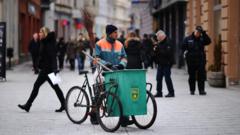During a distressing week, images flooding social media depict an alarming number of rats spotted in the Miljacka River and overflowing garbage bins in Sarajevo, Bosnia and Herzegovina’s capital. Local residents are expressing their frustrations, pointing to inadequate public services and rampant illegal dumping, which has created a perfect breeding ground for rats. This situation has escalated health experts' concerns, contributing to a rise in rat-borne illnesses among the population.
Health professionals indicate that a drastic failure to control the rodent population has led to a spike in infections, with a local hospital diagnosing multiple cases of leptospirosis in just one day. The disease, often referred to as rat fever, is transmitted to humans via contaminated water or soil, leading to serious symptoms including headaches and muscle pain, and in severe cases, life-threatening conditions such as jaundice and kidney failure.
In response to the increasing danger, local authorities have declared the situation an epidemic, giving rise to immediate cleanup measures that had been long overdue. A mobilization of additional municipal workers equipped with disinfectants is set to cleanse public spaces, while schools are instructed to conduct thorough cleanses of playgrounds and inspect for rodent activity.
This proactive stance sharply contrasts with previous years when pest control efforts were virtually non-existent due to bureaucratic mismanagement. Officials emphasize the need to address not only the rat problem but also the stray dog population, which has also proliferated in the city.
Sarajevo’s Canton Health Minister Enis Hasanovic described the incident as a "communal crisis," highlighting the local authorities' failure to meet necessary sanitation standards. Meanwhile, former clinical center director and current assembly member Sebija Izetbegović expressed concerns about potential future outbreaks, indicating that the well-fed rat population could lead to new health threats like hantavirus.
Fortunately, thus far, none of the leptospirosis cases reported have escalated to critical conditions, even as untreated leptospirosis knows a serious fatality risk. The situation in Sarajevo remains precarious, putting additional pressure on officials to take effective action.
Health professionals indicate that a drastic failure to control the rodent population has led to a spike in infections, with a local hospital diagnosing multiple cases of leptospirosis in just one day. The disease, often referred to as rat fever, is transmitted to humans via contaminated water or soil, leading to serious symptoms including headaches and muscle pain, and in severe cases, life-threatening conditions such as jaundice and kidney failure.
In response to the increasing danger, local authorities have declared the situation an epidemic, giving rise to immediate cleanup measures that had been long overdue. A mobilization of additional municipal workers equipped with disinfectants is set to cleanse public spaces, while schools are instructed to conduct thorough cleanses of playgrounds and inspect for rodent activity.
This proactive stance sharply contrasts with previous years when pest control efforts were virtually non-existent due to bureaucratic mismanagement. Officials emphasize the need to address not only the rat problem but also the stray dog population, which has also proliferated in the city.
Sarajevo’s Canton Health Minister Enis Hasanovic described the incident as a "communal crisis," highlighting the local authorities' failure to meet necessary sanitation standards. Meanwhile, former clinical center director and current assembly member Sebija Izetbegović expressed concerns about potential future outbreaks, indicating that the well-fed rat population could lead to new health threats like hantavirus.
Fortunately, thus far, none of the leptospirosis cases reported have escalated to critical conditions, even as untreated leptospirosis knows a serious fatality risk. The situation in Sarajevo remains precarious, putting additional pressure on officials to take effective action.






















